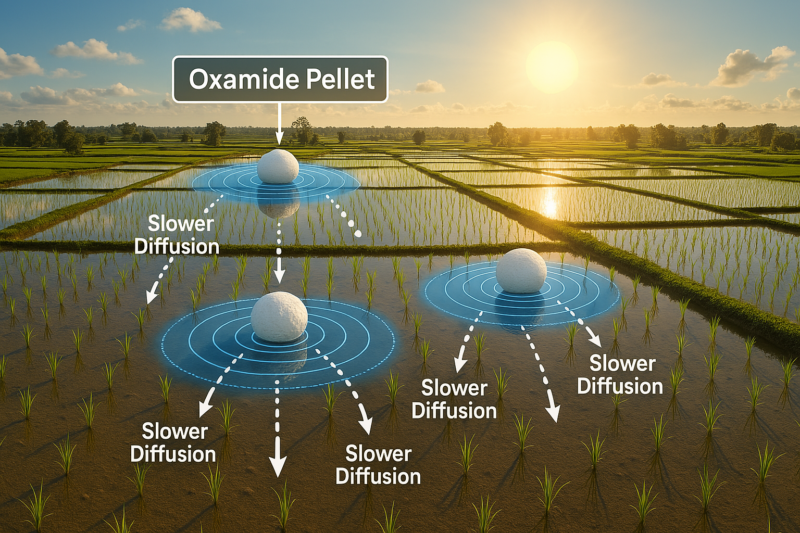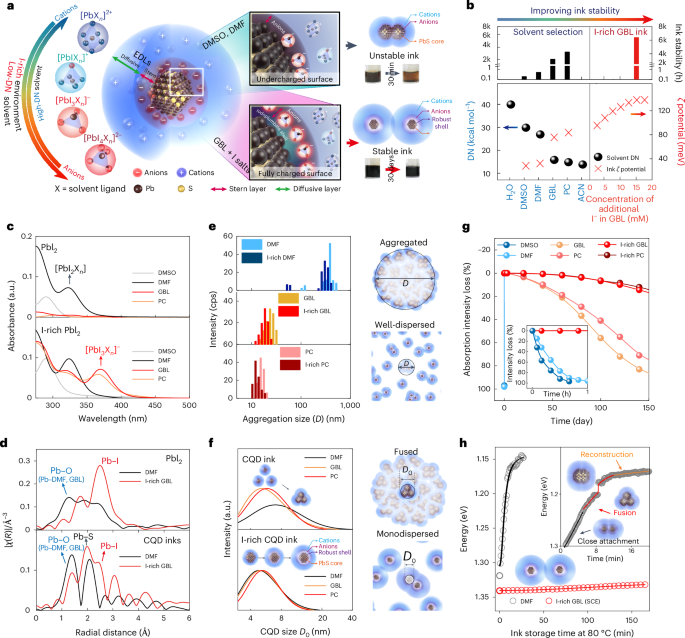Navigating the Perfect Storm: AI Agents and Data Fabrics Empower Supply Chain Heroes Amidst Trade and AI Wars
The Dual Disruption: Trade Tensions and the AI Revolution The global landscape is currently characterized by a dual wave of disruption, emanating from escalating geopolitical tensions manifesting as trade wars and the rapid advancements and intense competition within the realm of artificial intelligence, often referred to as AI wars. This convergence of global forces engenders […] The post Navigating the Perfect Storm: AI Agents and Data Fabrics Empower Supply Chain Heroes Amidst Trade and AI Wars appeared first on Logistics Viewpoints.


The Dual Disruption: Trade Tensions and the AI Revolution
 The global landscape is currently characterized by a dual wave of disruption, emanating from escalating geopolitical tensions manifesting as trade wars and the rapid advancements and intense competition within the realm of artificial intelligence, often referred to as AI wars. This convergence of global forces engenders unprecedented volatility and complexity within the intricate networks of global supply chains. Trade wars introduce tangible barriers such as tariffs and trade restrictions, directly impacting the sourcing of raw materials, manufacturing processes, and the flow of finished goods across international borders. Simultaneously, the AI wars, while not involving conventional military conflict, drive a relentless pace of technological innovation and intense competition in the development and deployment of artificial intelligence. This technological race can disrupt established operational norms and create new dependencies concerning data infrastructure and advanced analytical capabilities. The confluence of these two significant trends necessitates a paradigm shift in how supply chain professionals approach their roles, demanding innovative strategies and a heightened level of adaptability.
The global landscape is currently characterized by a dual wave of disruption, emanating from escalating geopolitical tensions manifesting as trade wars and the rapid advancements and intense competition within the realm of artificial intelligence, often referred to as AI wars. This convergence of global forces engenders unprecedented volatility and complexity within the intricate networks of global supply chains. Trade wars introduce tangible barriers such as tariffs and trade restrictions, directly impacting the sourcing of raw materials, manufacturing processes, and the flow of finished goods across international borders. Simultaneously, the AI wars, while not involving conventional military conflict, drive a relentless pace of technological innovation and intense competition in the development and deployment of artificial intelligence. This technological race can disrupt established operational norms and create new dependencies concerning data infrastructure and advanced analytical capabilities. The confluence of these two significant trends necessitates a paradigm shift in how supply chain professionals approach their roles, demanding innovative strategies and a heightened level of adaptability.
Exceeding Past Challenges: Why Current Disruptions Demand New Strategies
The level of disruption stemming from the combined impact of trade and AI-wars may potentially exceed the challenges encountered during the COVID-19 pandemic. While the pandemic primarily caused disruptions through lockdowns, shifts in consumer demand, and logistical bottlenecks, the current era introduces persistent policy uncertainty and escalating costs due to trade wars. Furthermore, the AI wars mandate a rapid adoption and integration of advanced technologies, leading to potentially more profound and enduring transformations in supply chain strategies and operations. The recent unfolding of trade war developments in April 2025 underscores the immediacy and significance of these challenges. The implementation of tariffs and trade restrictions by major global economies during this period creates tangible and pressing issues for supply chain professionals, demanding swift and effective responses.
Kinexions 2025: A Timely Forum for Navigating the Storm
 Amidst this backdrop of escalating global disruptions, Kinaxis’ Kinexions 2025 user conference, held from March 31 to April 2, 2025, took on heightened significance due to its proximity to the commencement of new trade war challenges on April 5, 2025. This timely convergence positioned the conference as a pivotal event for supply chain professionals seeking to gain insights and strategies to navigate the unfolding disruptions. Industry leaders, Kinaxis customers, and innovators convened to explore the future of supply chain orchestration, with AI-driven innovation emerging as a central theme of discussions. The conference served as a crucial platform for the real-time exchange of information and the formulation of strategic approaches to address the immediate challenges posed by the onset of trade wars.
Amidst this backdrop of escalating global disruptions, Kinaxis’ Kinexions 2025 user conference, held from March 31 to April 2, 2025, took on heightened significance due to its proximity to the commencement of new trade war challenges on April 5, 2025. This timely convergence positioned the conference as a pivotal event for supply chain professionals seeking to gain insights and strategies to navigate the unfolding disruptions. Industry leaders, Kinaxis customers, and innovators convened to explore the future of supply chain orchestration, with AI-driven innovation emerging as a central theme of discussions. The conference served as a crucial platform for the real-time exchange of information and the formulation of strategic approaches to address the immediate challenges posed by the onset of trade wars.
Forging Resilience: The Kinaxis-Databricks Partnership and the Supply Chain Data Fabric
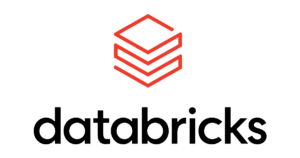 A significant highlight of Kinexions 2025 was Kinaxis’ announcement of its strategic partnership with Databricks. This collaboration is poised to be instrumental in forging a resilient supply chain by establishing a powerful Supply Chain Data Fabric for Kinaxis’ Maestro platform. A strong data foundation is increasingly recognized as essential for the effective deployment and utilization of AI Agents within supply chain management.
A significant highlight of Kinexions 2025 was Kinaxis’ announcement of its strategic partnership with Databricks. This collaboration is poised to be instrumental in forging a resilient supply chain by establishing a powerful Supply Chain Data Fabric for Kinaxis’ Maestro platform. A strong data foundation is increasingly recognized as essential for the effective deployment and utilization of AI Agents within supply chain management.
The Databricks Data Intelligence Platform offers several key benefits, including the ability to gain faster insights from complex data, unify disparate data sources into a single governed environment, and leverage scalable AI capabilities to address a wide range of supply chain challenges. Furthermore, Databricks’ Delta Sharing framework enables seamless and secure cross-platform data sharing, facilitating enhanced collaboration and data accessibility across the supply chain ecosystem. This partnership directly responds to the critical need for a unified and scalable data infrastructure capable of managing the intricacies arising from both trade and AI wars.
Official Kinaxis Press Release: The Strategic Partnership: Kinaxis and Databricks | ARC Advisory Group
Introducing AI Agents: Empowering Proactive Supply Chain Management
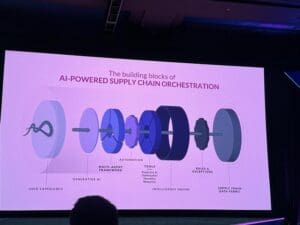 Kinaxis also announced the introduction of AI Agents within its Maestro platform at Kinexions 2025. These intelligent agents are designed to assist supply chain professionals in navigating disruptions and automating critical tasks such as inventory management and risk mitigation. By enhancing Maestro with AI Agents and a robust data fabric, Kinaxis aims to provide a crucial tool for supply chain professionals to effectively manage the complexities of the current environment. These AI Agents are envisioned as new allies for supply chain professionals, enabling them to transition from reactive problem-solving to proactive disruption management, thereby elevating their strategic importance within their organizations. During the keynote demonstration, these agents can do much more than regurgitate data and words. They can manipulate your data and perform tasks such as building a graph.
Kinaxis also announced the introduction of AI Agents within its Maestro platform at Kinexions 2025. These intelligent agents are designed to assist supply chain professionals in navigating disruptions and automating critical tasks such as inventory management and risk mitigation. By enhancing Maestro with AI Agents and a robust data fabric, Kinaxis aims to provide a crucial tool for supply chain professionals to effectively manage the complexities of the current environment. These AI Agents are envisioned as new allies for supply chain professionals, enabling them to transition from reactive problem-solving to proactive disruption management, thereby elevating their strategic importance within their organizations. During the keynote demonstration, these agents can do much more than regurgitate data and words. They can manipulate your data and perform tasks such as building a graph.
Beyond the Hype: The Need for Sophisticated AI and Data Strategies
The confluence of trade and AI-wars presents a wave of disruptions that may potentially exceed the challenges encountered during the COVID-19 pandemic. Traditional supply chain planning methods, often reliant on historical data and manual adjustments, are proving inadequate in the face of such dynamic and unpredictable forces. The increasing sophistication of Industrial AI deployments, moving beyond the initial hype surrounding Generative AI, necessitates a strategic selection of data science and AI/ML tools tailored to specific use cases. This nuanced approach, encompassing a broader AI/ML toolkit, is essential for effectively addressing the multifaceted challenges posed by the current global landscape.
Data Quality as the Bedrock: Enabling Trustworthy AI
To ensure the effectiveness and reliability of AI Agents in supply chain management, a strong foundation of data quality and accuracy is paramount. This necessitates the implementation of robust DataOps and AIOps capabilities, built upon Industrial-grade Data Fabrics. These capabilities are crucial for supply chain professionals to trust and effectively utilize AI Agents in their decision-making processes. The principle of “garbage in, garbage out” remains highly pertinent, emphasizing that the intelligence and effectiveness of AI Agents are directly proportional to the quality of the data they are trained and operate on.
Conclusion: Equipping Supply Chain Heroes for the Era of Intelligent Disruption
In conclusion, the convergence of trade wars and AI-wars has created a perfect storm of disruptions for global supply chains, demanding a new era of intelligent tools and strategic thinking. Kinaxis’ announcements at Kinexions 2025, particularly the partnership with Databricks and the introduction of AI Agents in Maestro, represent a significant step toward empowering supply chain professionals to navigate these turbulent times and emerge as heroes in this landscape of intelligent disruption. By embracing these technological advancements and prioritizing data quality through robust DataOps and AIOps capabilities built upon Industrial-grade Data Fabrics, supply chain professionals can effectively leverage the power of AI to ensure resilience, agility, and success in the face of unprecedented challenges.
Table 1: Timeline of Trade War Developments (April 2025)
| Date | Event Description |
| April 2, 2025 | Trump announces sweeping reciprocal tariffs on almost all countries. |
| April 3, 2025 | US imposes 25% tariffs on imported cars and key auto parts. |
| April 4, 2025 | China retaliates with a 34% tariff on all US imports. |
| April 5, 2025 | A baseline 10% tariff takes effect on imports from most countries. |
| April 9, 2025 | Country-specific reciprocal tariffs take effect. |
| April 10, 2025 | China’s 34% tariff on all US imports goes into effect. |
Table 2: Key Features of Kinaxis Maestro with AI Agents and Databricks Data Fabric
| Feature | Description | Benefits |
| AI Agents in Maestro | Intelligent software programs that can monitor, predict, and take action in real-time, automating tasks like inventory management and disruption mitigation. | Increased efficiency, faster decision-making, proactive disruption management, and reduced manual effort. |
| Databricks Data Intelligence Platform Integration | Provides a unified data environment by combining data warehousing, data engineering, and AI capabilities. | Faster insights, unified data from various sources, scalable AI for complex data environments, and enhanced performance. |
| Supply Chain Data Fabric | A robust data foundation built on the Kinaxis-Databricks partnership, integrating internal and external data sources. | Enables a single source of truth, improves data accessibility and quality, and supports advanced analytics and AI applications. |
| Delta Sharing | Databricks’ framework for seamless and secure cross-platform data sharing. | Facilitates collaboration across the supply chain ecosystem, reduces data silos and duplication, and enables real-time data exchange. |
Table 3: Challenges and Solutions in Ensuring Data Quality for Industrial AI
| Challenge | Solution |
| Data Silos | Industrial Data Fabrics |
| Data Inaccuracy & Inconsistency | DataOps Practices (Data Governance, Quality Checks, Monitoring) |
| Data Complexity & Variety | Industrial Data Fabrics, AI-powered Validation & Cleansing |
| Lack of Trust in AI | Explainable AI, Data Lineage, Robust Governance |
The post Navigating the Perfect Storm: AI Agents and Data Fabrics Empower Supply Chain Heroes Amidst Trade and AI Wars appeared first on Logistics Viewpoints.











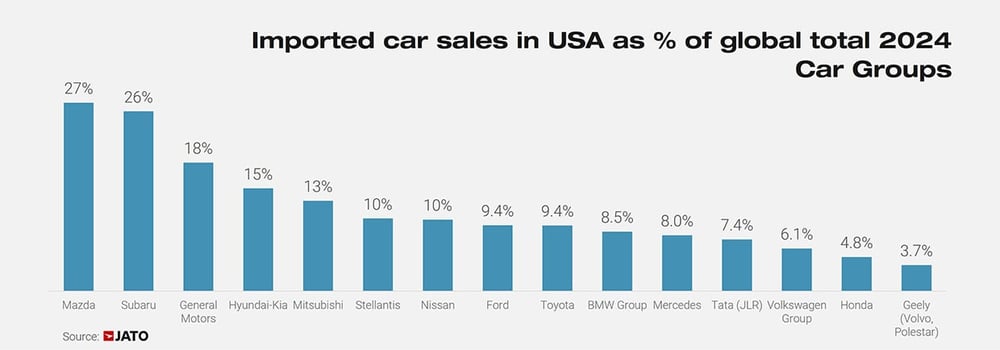



















































































![F/A-XX hints, icebreaker ambitions and previewing day two of Sea Air Space [VIDEO]](https://breakingdefense.com/wp-content/uploads/sites/3/2025/04/250407_SAS_2025_indopac_WELCH-scaled-e1744076170241.jpg?#)





























